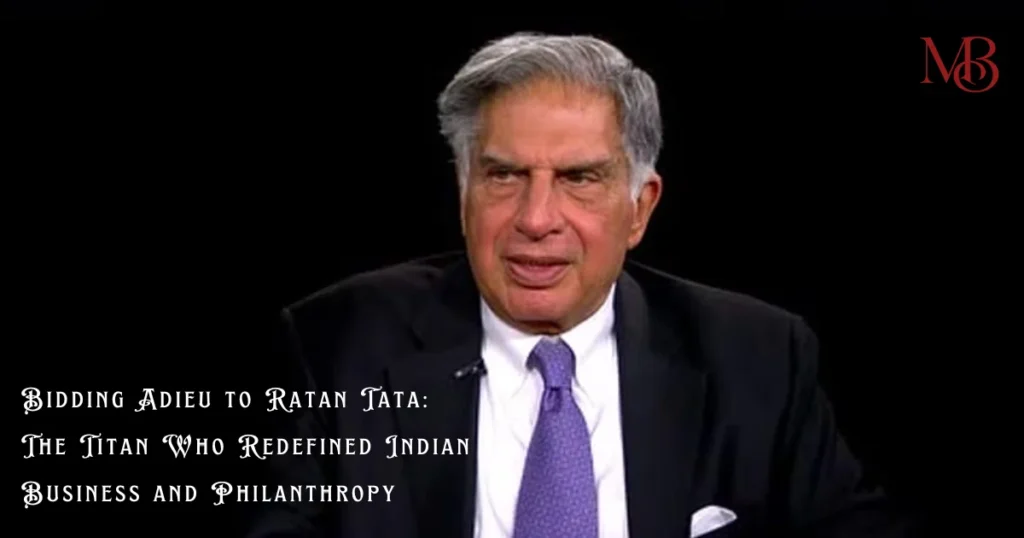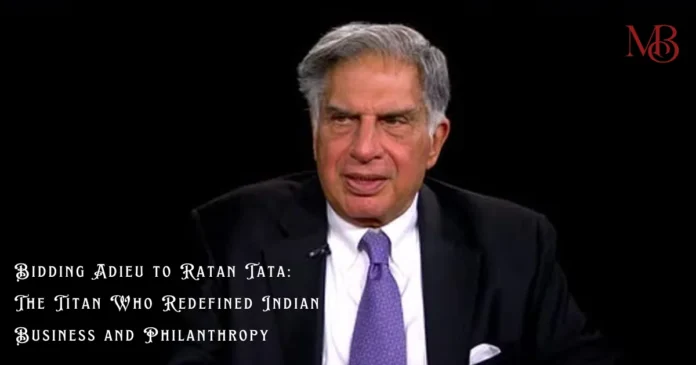The world has lost a giant. India’s most respected industrialist and philanthropist, Ratan Tata, passed on October 9, 2024, an unforgettable legacy that will inspire generations. As the Chairman Emeritus of Tata Sons and the visionary spirit driving the Tata Group, his life was a testament to visionary leadership, humility, and an unwavering commitment to building a nation. This tribute to Ratan Tata captures not just the incredible heights he achieved in business but also celebrates the impact as a human being who believed in the power of giving back.

The Early Years: Foundations of Integrity
Ratan Tata was born on December 28, 1937, in Mumbai into a family synonymous with Indian industrial prowess. When his parents separated when he was little, he had been brought up by his grandmother, but these troublesome times actually formed the bedrock of his humility and good morals. While being one of India’s most influential families, Tata remained earthy throughout his life and often credits his values to the lessons imparted by his grandmother.
Ratan Tata did his architecture from Cornell University and did his Advanced Management Program from Harvard Business School. International exposure gave him a world view, which he introduced to Tata Group and made the company cross borders in India. However, most importantly, early experiences fashioned him into a leader who valued ethics almost as much as profits-a quality that is very rare in today’s business world.
A Visionary Leader: The Transformation of Tata Group
When Ratan Tata became the Chairman of Tata Sons in 1991, people widely wondered if he was able to fill the shoes of his predecessors. The Tata Group already was a gigantic enterprise but was interested in a myriad of different fields and seen as a rather traditional and locally focused conglomerate. Ratan Tata changed those views.
He transformed the Tata Group into a global powerhouse. Under his direction, the Group made a number of high-profile acquisitions that placed Indian industry on the global map. Among them was the acquisition of Tetley Tea in 2000, Corus Steel in 2007, and of course, the iconic brand, Jaguar Land Rover in 2008. All of these were strategically planned and flourished under Tata’s stewardship. By the time he retired in 2012, the Tata Group’s revenues had multiplied, crossing $100 billion, a manifold increase from its previous figures.
But Ratan Tata’s leadership was not just about the market space. The innovation commitment created Tata Nano, which is probably the cheapest car in the world. Commercially, Nano did not boom, but it did something unprecedented-to make mobility accessible to millions of Indians. His career became quite distinctive with the passion to create products that could benefit people’s lives.
Ethical Leadership: Beacon of Integrity
When the world viewed business as a word wherein profitability takes precedence over morals, it did not come as a shock when Ratan Tata steered the company differently. He was vocal about upholding the highest standards of corporate governance in the company. Under his leadership, Tata became synonymous with trust and integrity.
His decisions often went by what was best for the society and not by the shareholders’ or the group’s balance sheets. For instance, during the 26/11 Mumbai attacks in 2008, the Taj Mahal Palace Hotel, a Tata property, was one of the prime targets. As soon as the tragedy occurred, Ratan Tata himself handled the relief works. The Tata Group stepped forward and aided every single affected person-employees to the guests in the hotels. The company extended financial support, education, and even sought-out psychological counseling for people affected. So all said and done, business in Tata was always pretty much mired with human welfare, as it well used to be, back in its day.
A Lifelong Commitment to Philanthropy
To that extent, Ratan Tata was quintessential: he was philanthropic. The Tata Group under his leadership earmarked a percentage of its profits for social causes. Education, healthcare, and rural development could well rank high on the passions list of Ratan Tata because the Tata Trusts, one of India’s oldest philanthropic organizations, became the vehicle of these initiatives.
He has left his footprint in medical science. Ratan Tata made it possible to set up cancer treatment centers throughout all of India so that the not so lucky could get health treatments at affordable prices. The Tata Memorial Hospital is in Mumbai. It is one of the best in research and cancer treatment in the entire world. Much of what he achieved was because of his vision.
His contributions were equally deep in the educational sphere. The Tata Scholarship Fund that Cornell University has established continues to fund students from India for higher education overseas. Investments in research institutions like the Indian Institute of Science and the Tata Institute of Fundamental Research have had profound impacts on Indian academia.
A Leader Beyond Business: Humility and Humanity
Humility brought the humility in Ratan Tata. While he was one of India’s richest men, he was known to drive himself to work-which said nothing for his humility alone. Compassionate and genuinely concerned, he treated employees, business partners, and the common public alike.
Another big supporter of entrepreneurs and startups was Ratan Tata. He still during his post retirement career ventured into several promising businesses, especially in the technology arena. Large companies such as Paytm and Ola Cabs were also supported by his investment, which reflects his huge interest in the future entrepreneurial map of India. It was not just the financial support but the mentorship that helped thousands of young business leaders gain confidence in India.
Lessons from the Life of Ratan Tata
The life of Ratan Tata teaches a number of lessons to aspiring entrepreneurs, corporate leaders, and philanthropists. Above all, there is the lesson of integrity. Shortcuts everywhere are often rewarded; long-term success is built on a foundation of trust and ethical behavior.
He also exemplified vision. Ratan Tata never hesitated from a landmark wish for Tatas, whether it was bringing global brands like Jaguar and Land Rover to Indian shores or innovation in products like Nano for the Indian market. His aggressive forays in Indian business only led to more significance for India and Indians, but they always went hand-in-hand with thoughtful planning and focus on quality.
Last but not the least, his life was testimony to giving back. Success, for Ratan Tata, wasn’t just personal wealth or corporate growth; it was about leveraging resources towards uplifting society-be it healthcare, education, or disaster relief. His philanthropy, like his business ventures, was markedly driven by an overriding sense of social responsibility.
A Legacy That Will Inspire Generations
As we bid adieu to Ratan Tata, we must remember that his legacy extends far beyond the businesses he built. It’s about lives touched, values stood for, and the future that he visualized for India and the world. This is going to be a great loss, something impossible to replace, but his principles, his vision, and his contributions will continue to inspire newer generations.
Ramoji Rao: The Teacher Who Built a Media Empire
In a world that constantly harps on profits and people, Ratan Tata showed us that it is possible to do both and that it can be done well. He was the beacon of hope, a paragon of integrity, and a true titan of Indian industry, with his life and legacy reminding us forever that with great power comes even greater responsibility. Follow our rendezvous page and stay updated!



Undoubtedly Late Ratan Tata was one of the biggest lovable personality in the entire world. He was not only an industrialist n philanthropist but a leader of masses as a generous human being.